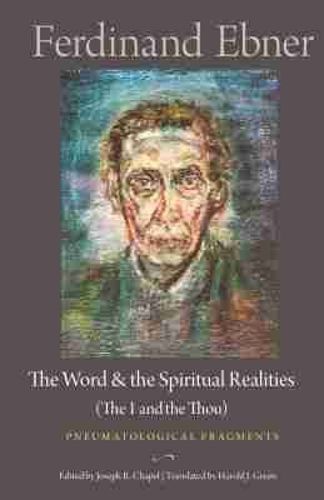Readings Newsletter
Become a Readings Member to make your shopping experience even easier.
Sign in or sign up for free!
You’re not far away from qualifying for FREE standard shipping within Australia
You’ve qualified for FREE standard shipping within Australia
The cart is loading…






This volume will constitute the first published English translation of Ferdinand Ebner’s seminal 1921 work, Das Wort und die geistigen realitaten - long available in major languages but never in English. It is frequently compared with Martin Buber’s I and Thou, published in 1923, which actually draws its central I-Thou insight from Ebner.
In recent centuries, Philosophy reflects a turn toward the autonomous subject versus a biblical sense of person. The limits/failures of science manifest in the horrors of World War I led to the emergence of a Dialogical Personalist Philosophy in reaction to the universal doubt of Cartesian thought and to German idealism, which engages the idea or representation but not the reality of things-in-themselves.
The core of Ebner: human speech is constitutive of human existence: humans are given the word.
Having the word is a miraculous gift from God. It is only in the word, in language, that an I meets a Thou, that relationship and self-identity can occur, and this word is given in Jesus Christ, the Word made flesh: In the beginning was the Word ; Jesus, the Logos of St. John’s Gospel, mediates between God and man and stands between I and Thou. It is through Jesus that it is possible to address God in the human thou. The key to life’s meaning, to the centrality of relationship, and to God’s continuous action in HIs creation, is found in the I-Thou question: why the I can never be found in itself, and so must look in the thou, while the false I will try to possess the thou as an object of power. This is Ebner’s critique of idealist thought: reality, truth, and personal identity are neither ideas, nor found in ideas, therefore, Descartes’ cogito must be rejected, for the existence of the I can’t be founded or proved by solitary thinking, but only in relation with a thou.
$9.00 standard shipping within Australia
FREE standard shipping within Australia for orders over $100.00
Express & International shipping calculated at checkout
This volume will constitute the first published English translation of Ferdinand Ebner’s seminal 1921 work, Das Wort und die geistigen realitaten - long available in major languages but never in English. It is frequently compared with Martin Buber’s I and Thou, published in 1923, which actually draws its central I-Thou insight from Ebner.
In recent centuries, Philosophy reflects a turn toward the autonomous subject versus a biblical sense of person. The limits/failures of science manifest in the horrors of World War I led to the emergence of a Dialogical Personalist Philosophy in reaction to the universal doubt of Cartesian thought and to German idealism, which engages the idea or representation but not the reality of things-in-themselves.
The core of Ebner: human speech is constitutive of human existence: humans are given the word.
Having the word is a miraculous gift from God. It is only in the word, in language, that an I meets a Thou, that relationship and self-identity can occur, and this word is given in Jesus Christ, the Word made flesh: In the beginning was the Word ; Jesus, the Logos of St. John’s Gospel, mediates between God and man and stands between I and Thou. It is through Jesus that it is possible to address God in the human thou. The key to life’s meaning, to the centrality of relationship, and to God’s continuous action in HIs creation, is found in the I-Thou question: why the I can never be found in itself, and so must look in the thou, while the false I will try to possess the thou as an object of power. This is Ebner’s critique of idealist thought: reality, truth, and personal identity are neither ideas, nor found in ideas, therefore, Descartes’ cogito must be rejected, for the existence of the I can’t be founded or proved by solitary thinking, but only in relation with a thou.